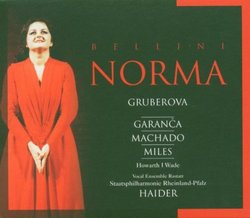| All Artists: Alastair Miles, Aquiles Machado, Edita Gruberova, Elina Garanca, Friedrich Haider, Staatsphilharmonie Rheinland-Pfalz Title: Bellini: Norma Members Wishing: 0 Total Copies: 0 Label: Nightingale Classics Original Release Date: 5/24/2005 Release Date: 5/24/2005 Album Type: Import Genre: Classical Style: Opera & Classical Vocal Number of Discs: 2 SwapaCD Credits: 2 UPC: 9004686040245 |
Search - Alastair Miles, Aquiles Machado, Edita Gruberova :: Bellini: Norma
 | Alastair Miles, Aquiles Machado, Edita Gruberova Bellini: Norma Genre: Classical
|
Larger Image |
CD Details |
CD ReviewsEuropean Opera Superstar Underrated in the US Opera Obsessed | Baltimore, MD USA | 10/06/2006 (5 out of 5 stars) "Norma is an opera of common misconceptions. It does not hold the popularity of Carmen, Aida, or La Boheme, and performances of it remain rare. Its elusiveness can be attributed to the rare mastery it requires to perform it adequately, and the sophistication it requires for it to be truly appreciated by opera-goers. Rosa Ponselle, Maria Callas, Joan Sutherland, Renata Scotto, and Montserrat Caballe belong to the very exclusive club of great Normas in the 20th Century. Great Adalgisas are even more rare. But now we have Edita Gruberova. Edita Gruberova is a tremendous star in Europe, especially in Germany and Austria, although she does not sing anymore in the US and is completely underappreciated here because of her underrepresentation. She made this recording at 58, and contrary to almost any other singer at that age, is at the very top of her form. The Slovakian dramatic coloratura is one of the greatest wonders in operatic longevity ever. It is grossly incorrect to call Norma a "bel canto" opera, nor can it be sung in a bel canto style. Norma's vocal type is not the traditional coloratura of the bel canto era. Norma must sing fast, ornamented runs with the agility of a coloratura but combined with the dark resonance of a dramatic soprano. Richard Wagner, who would later compose some of opera's greatest music for the dramatic dramatic soprano, found inspiration in Bellini's music, and at times in the opera Norma, one could mistake his writing for Wagner's. Bellini, in fact, predated Wagner. While bel canto elements can be isolated in parts of the opera, it is an oversimplification to consider Norma a bel canto opera because of the convergence of so many other elements that would set the stage of the more dramatic and darker periods that would enter later into the genre. Gruberova perceives the complexities of the role and has fully reinterpreted Norma in an original manner. While Maria Callas revolutionized this role in the 50's, many of her successors imitated her style. Gruberova sings the role with complete freshness. Although she is noted for her superior bel canto interpretations, and her dramatic coloratura voice tends more towards the coloratura side than the dramatic, it is a misinterpration to claim that she sings the opera in a bel canto style. In my opinion, the most moving parts are those that she sings more slowly in the lower register that she brings out with her great expressiveness. Her interpretation of "Dormono entrambi," when Norma is driven to almost kill her children, is perhaps the most stirring of the whole recording. Elina Garanca is a fine Adalgisa. She is appropriately matched with Gruberova, especially because he darker tone distinguishes her as a mezzo from Gruberova's relatively higher timbre. Garanca has remarkable flexibility and range for a mezzo, and her high C's are powerful and secure, which is rare for mezzos. This is my favorite studio recording of Norma along with the Sutherland and Horne one. However, despite its greatness, it still does not surpass the live 1955 Norma with Callas and del Monaco." Gruberova's contribution to Norma M. Montenegro | mexico | 01/26/2006 (4 out of 5 stars) "There are plenty of recordings of Norma, but this one offers the work without cuts and the aria casta diva in the original key (as done with the Sutherland-Horne studio recording). Gruberova does a very good job, but not in the dramatic soprano way, but in the pure bel canto style. That does not mean that dramma is lacking in this Norma: Gruberova has all the resources to make the most of the dramatic moments, and she SINGS the roll (something many sopranos forget when doing Norma). This Norma does not replace the Callas, Sutherland, Gencer and caballe recordings, but makes a good contribution to them bringing the lyrical core of the roll and including great music that has been traditional cut. The rest of the cast is in good level and Elina Garanca is a great Adalgisa: creamy, young, even voice with great sense of style."
|

 Track Listings (22) - Disc #1
Track Listings (22) - Disc #1